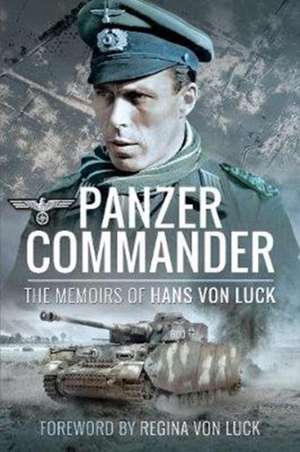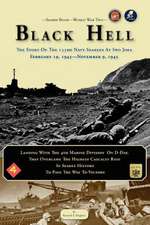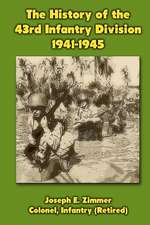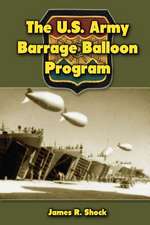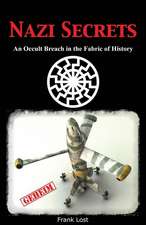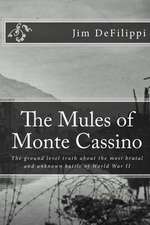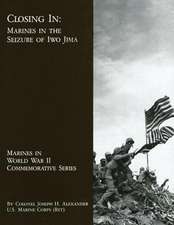Panzer Commander
Autor Hans Von Lucken Limba Engleză Paperback – 9 sep 2020
In 1941 Hitler's forces turned their attention to the East, launching their invasion of the Soviet Union, Operation Barbarossa, on 22 June. Hans von Luck's unit was one of the many deployed in that offensive.
Von Luck then served with the Afrika Korps in the Western Desert. In describing his service in this theatre, he tells of the occasionally chivalrous relationship with the men of the Eighth Army. After the Axis collapse in Africa, he returned to Europe and fought throughout the Normandy Campaign.
Captured by the Soviets at the end of the war, he was held for five years in a prisoner of war camp. After the war, he formed friendships with those who had been his opponents during the war, including Major John Howard, who had led the capture of Pegasus Bridge on D-Day.
As the renowned historian M.R.D. Foot once wrote, Panzer Commander is 'a book that shows the finest face of the old officer class, the Kaderfamilie of central Europe, who were brought up to fight, but to fight clean - even when they came under the orders of satanic leaders'. That this unique and insightful account of one man's war and its aftermath is one of the classic memoirs of the Second World War is beyond doubt.
| Toate formatele și edițiile | Preț | Express |
|---|---|---|
| Paperback (2) | 55.61 lei 3-5 săpt. | |
| dell – 31 dec 1990 | 55.61 lei 3-5 săpt. | |
| Pen & Sword Books – 9 sep 2020 | 96.93 lei 3-5 săpt. | +19.59 lei 6-10 zile |
Preț: 96.93 lei
Nou
Puncte Express: 145
Preț estimativ în valută:
18.55€ • 18.100$ • 15.43£
18.55€ • 18.100$ • 15.43£
Carte disponibilă
Livrare economică 26 februarie-12 martie
Livrare express 11-15 februarie pentru 29.58 lei
Preluare comenzi: 021 569.72.76
Specificații
ISBN-13: 9781526781833
ISBN-10: 1526781832
Pagini: 320
Ilustrații: 16 black and white illustrations
Dimensiuni: 155 x 231 x 23 mm
Greutate: 0.48 kg
Editura: Pen & Sword Books
ISBN-10: 1526781832
Pagini: 320
Ilustrații: 16 black and white illustrations
Dimensiuni: 155 x 231 x 23 mm
Greutate: 0.48 kg
Editura: Pen & Sword Books
Descriere
The memoirs of a Panzer commander who served on all major fronts of the Second World War. A professional soldier, Hans von Luck joined the Panzerwaffe in its earliest days, serving under Erwin Rommel.
Notă biografică
Hans von Luck was born in 1911 in Flensburg, Germany, the son of a naval officer. Although he would have preferred to study law, he followed the path of duty and in 1929 entered the Reichswehr as a cadet officer. In 1939 his motorized unit was one of the first to cross the frontier into Poland, marking the start of World War II. Thereafter he was constantly in action in every major theatre of war. He was wounded twice and received two of his country's highest awards for gallantry, the German Cross in Gold and the Knight's Cross. He ended the war a full colonel, one of the youngest in the German army. He is married, for the second time, and has three sons.
Extras
Prologue
RELEASE
It was a cold winter's day at the end of 1949 in a special camp for prisoners of war in the neighborhood of Kiev; at two o'clock in the morning a barrack door flew open.
"Ganz von Luck," shouted a Russian guard. "Davai, to the office."
I still have to smile: the Russians cannot pronounce the H sound. How amused we had been a few years earlier when at the shout of "Goggenloge" no one had stirred. Intended was Prince Hohenlohe.
We German prisoners of war had been in Russia since June 1945; since the late autumn of 1948, former members of the SS and the police, and also all those who had fought against partisans, had been collected into a kind of punishment camp. Also included- something none of us could understand-were all staflf officers.
Drunk with sleep I stood up. The Russians were fond of interrogations by night. It was easier to extract something from a tired pasoner.
A few weeks earlier, the camp interpreter, a Jewish doctor with whom I had become friendly, had told me what was in the wind.
"I have heard that under pressure from the Western Allies Stalin has agreed to observe the Geneva Conventions and release the prisoners. In the ordinary camps the releases are almost complete, but even here releases will be made. Fifteen percent will be condemned and remain here. We don't want to send home any war criminals. Besides, we need manpower."
Not long after, commissions had indeed arrived from Moscow. At nocturnal hearings, by some system incomprehensible to us, 15 percent had to be sorted out; the rest really would be transported home. A five-person commission from Moscow would make the decision.
And now it was my turn!
My nerves were at breaking point. I forced myself to keep calm. I spoke good Russian; while a prisoner I had been able to improve my knowledge of the language and had often been used as an interpreter. At the office, the commissioners' interpreter, a young woman I knew well, was waiting for me. "I don't understand or speak a word of Russian," I whispered to her. "Understand?" She smiled and nodded; she would go along with my charade.
I was led into a large room and saw in front of me a big, T-shaped table, at the head of which sat the commission. In the middle was a Russian colonel, apparently its leader, an affable-looking man of about my own age, bedecked with orders and with an almost square head. He looked like Marshal Georgi Zhokov, the "liberator" of Berlin.
On either side were civilians, probably a public prosecutor and KGB officers. They looked rather less affable and stared at me with impenetrable expressions. At the other end of the table, about 20 feet away, I took my place with the interpreter.
The hearing began.
"What is your name? Your unit? Where were you in action in Russia?"
The interpreter translated, I replied in German, "I have already said all that at least twenty times for the record."
"We want to hear it again," said the Colonel.
My statements seemed to agree with their documents. They nodded their approval.
Then, "You capitalist, reactionary; von Luck is like von Ribbentrop (foreign minister under Hitler), von Papen (chancellor before Hitler). Everyone with 'von' is a big capitalist and a big Nazi."
After the translation I replied, "I have nothing to do with Ribbentrop or Papen. I have been in the war for more than five years and then five years in captivity. That's more than ten years of my life. I should now like to live in peace with my family, follow a profession. I have neither money nor landed property, so what's all this about capitalist, Nazi, and so on?"
The interpreter translated word for word.
They didn't seem to have anything else to lay at my door. So the Colonel turned to his colleague and spoke openly in Russian.
"What shall we do with the polkovaik (colonel)? He's not a member of the SS or the police. At the time of the partisan struggles he was already in Africa. But I hate to let one of these vons get away."
One of the KGB officers chimed in, "We can charge him with stealing eggs from Russian villages and thus committing 'sabotage' against the Russian people."
That was the last straw. I knew that even such a minor offense could incur ten to fifteen years in a punishment camp.
I stood up and, as a start, uttered one of the worst Russian oaths. (The Russians and Hungarians are said to have the coarsest of oaths.)
I saw the shocked face of the interpreter and the astonishment of the Colonel and his associates.
Only now and in this way, I thought, would I have the chance of going home.
After a short pause for effect, I spoke accordingly, "Polkovr~ik, you are a colonel like me. (I deliberately used the familiar du form of address.) You have done your duty in the war just like me. Both of us believed we had to defend our homeland. We Germans were probably misled by highly accomplished, one-sided propaganda. Both of us have taken an oath."
The Colonel listened attentively.
"It's three o'clock in the morning," I went on. "I am tired. At six we shall be woken up again to start another day of our captivity."
"I know the Russian law. The accused has to prove his innocence and not the court the guilt of the defendant. How shall I defend myself? If you want to keep me here, you'll find a reason all right. So make it brief and then let me go to sleep."
There followed a short whispered conversation between the Colonel and his colleagues. Then the Colonel said, "You speak Russian. Where did you learn it?" His tone was placid, almost benevolent.
"I was interested in the Russian language, Russian music, and Russian writers even as a young man. Long before this wretched war broke out I learned Russian from emigrants. In the nine months of my service in Russia, but above all in the last four and a half years, I have been able to improve my knowledge. I admit it was tactics to let the interpreter translate."
They smiled and my position seemed to me to be a little less hopeless.
Then came a surprising question from the Colonel, "What do you think of Russia and her people?"
"I have seen much and learned much in the years of my captivity. I like your vast country, I like the people, their readiness to
help, their love of their homeland. I think I have grasped something of the Russian mentality and soul. But I am not a Communist and never in my life will I be one. I am disappointed by what is left of Marx's ideas and Lenin's revolution. I should like our people to learn to understand each other, in spite of our many contrasts and different ideologies. That is my answer to your question, Polkornik."
It was a gamble, but I felt that in my situation attack was the best form of defense.
"If you are allowed to go home," continued the Colonel, "we know you will become a soldier again and fight against us."
I shook my head and replied, "I should like to get home at last and help to rebuild my bomb-damaged country and establish a democracy and live in peace, nothing else."
At that came the familiar "Davai" from the Colonel.
I went back to my barrack. My fellow prisoners crowded around me at once, and after I had described the course of the hearing, they all said the same, "You're mad, that's your undoing. You'll have to stay here." But I judged the Russians differently.
Next morning the interpreter came along. "That was risky, Polkornik, but good. I think you impressed the Colonel. He was a frontline soldier like you and he understands tough talking."
Two days later, in the early hours of the morning, I was called out of bed by one of the guards. My roommates said good-bye to me: "All the best, old man, wherever your journey may take you." In the courtyard prisoners from every barrack were assembling with their few possessions. At a table sat a Russian officer with a list of names, from which he called out one after the other. The man who was called went to the table. There he heard either "Davai," which now meant release, or the fateful "Niet."
We saw the stricken faces of those who had been singled out with "Niet" and hardly trusted ourselves to look at them. I was the third of our section who had to step up to the table. As the man before me heard "Niet," I patted him sympathetically on the shoulder.
Which word would I hear? It was "Davai"!
More running than walking, I hurried to the camp gate. A great stone fell from my heart. We didn't dare look round for fear they might still fetch us back. Did this really mean release?
There I found the interpreter. "Domoi, Polkovnik, all the best." I still think of her today, full of gratitude.
Then we marched to the station, where a train was standing ready to take us away. We still didn't trust the Russians. In which direction would it go? But after we had got in, the doors remained unlocked, for the first time in five years. Our joy knew no bounds. We could hardly take it in, that the day we had dreamed of for so many years had now come at last.
It was bitterly cold. In spite of that we left the doors open a crack, for fear they might be bolted again. We lay pressed tight together and hardly felt the cold.
A few sang quietly, others imagined the first thing they would eat, what it would be like after nearly five years to be face to face with their own wife or girlfriend. No one was ashamed of his feelmgs.
We all knew that when we reached home it would be like being born again.
My thoughts went back to my youth, to the security of my parents' house and to the many pleasant years, until Hitler came along and the war began. Of my 39 years I had spent more than 10 at war and in captivity.
RELEASE
It was a cold winter's day at the end of 1949 in a special camp for prisoners of war in the neighborhood of Kiev; at two o'clock in the morning a barrack door flew open.
"Ganz von Luck," shouted a Russian guard. "Davai, to the office."
I still have to smile: the Russians cannot pronounce the H sound. How amused we had been a few years earlier when at the shout of "Goggenloge" no one had stirred. Intended was Prince Hohenlohe.
We German prisoners of war had been in Russia since June 1945; since the late autumn of 1948, former members of the SS and the police, and also all those who had fought against partisans, had been collected into a kind of punishment camp. Also included- something none of us could understand-were all staflf officers.
Drunk with sleep I stood up. The Russians were fond of interrogations by night. It was easier to extract something from a tired pasoner.
A few weeks earlier, the camp interpreter, a Jewish doctor with whom I had become friendly, had told me what was in the wind.
"I have heard that under pressure from the Western Allies Stalin has agreed to observe the Geneva Conventions and release the prisoners. In the ordinary camps the releases are almost complete, but even here releases will be made. Fifteen percent will be condemned and remain here. We don't want to send home any war criminals. Besides, we need manpower."
Not long after, commissions had indeed arrived from Moscow. At nocturnal hearings, by some system incomprehensible to us, 15 percent had to be sorted out; the rest really would be transported home. A five-person commission from Moscow would make the decision.
And now it was my turn!
My nerves were at breaking point. I forced myself to keep calm. I spoke good Russian; while a prisoner I had been able to improve my knowledge of the language and had often been used as an interpreter. At the office, the commissioners' interpreter, a young woman I knew well, was waiting for me. "I don't understand or speak a word of Russian," I whispered to her. "Understand?" She smiled and nodded; she would go along with my charade.
I was led into a large room and saw in front of me a big, T-shaped table, at the head of which sat the commission. In the middle was a Russian colonel, apparently its leader, an affable-looking man of about my own age, bedecked with orders and with an almost square head. He looked like Marshal Georgi Zhokov, the "liberator" of Berlin.
On either side were civilians, probably a public prosecutor and KGB officers. They looked rather less affable and stared at me with impenetrable expressions. At the other end of the table, about 20 feet away, I took my place with the interpreter.
The hearing began.
"What is your name? Your unit? Where were you in action in Russia?"
The interpreter translated, I replied in German, "I have already said all that at least twenty times for the record."
"We want to hear it again," said the Colonel.
My statements seemed to agree with their documents. They nodded their approval.
Then, "You capitalist, reactionary; von Luck is like von Ribbentrop (foreign minister under Hitler), von Papen (chancellor before Hitler). Everyone with 'von' is a big capitalist and a big Nazi."
After the translation I replied, "I have nothing to do with Ribbentrop or Papen. I have been in the war for more than five years and then five years in captivity. That's more than ten years of my life. I should now like to live in peace with my family, follow a profession. I have neither money nor landed property, so what's all this about capitalist, Nazi, and so on?"
The interpreter translated word for word.
They didn't seem to have anything else to lay at my door. So the Colonel turned to his colleague and spoke openly in Russian.
"What shall we do with the polkovaik (colonel)? He's not a member of the SS or the police. At the time of the partisan struggles he was already in Africa. But I hate to let one of these vons get away."
One of the KGB officers chimed in, "We can charge him with stealing eggs from Russian villages and thus committing 'sabotage' against the Russian people."
That was the last straw. I knew that even such a minor offense could incur ten to fifteen years in a punishment camp.
I stood up and, as a start, uttered one of the worst Russian oaths. (The Russians and Hungarians are said to have the coarsest of oaths.)
I saw the shocked face of the interpreter and the astonishment of the Colonel and his associates.
Only now and in this way, I thought, would I have the chance of going home.
After a short pause for effect, I spoke accordingly, "Polkovr~ik, you are a colonel like me. (I deliberately used the familiar du form of address.) You have done your duty in the war just like me. Both of us believed we had to defend our homeland. We Germans were probably misled by highly accomplished, one-sided propaganda. Both of us have taken an oath."
The Colonel listened attentively.
"It's three o'clock in the morning," I went on. "I am tired. At six we shall be woken up again to start another day of our captivity."
"I know the Russian law. The accused has to prove his innocence and not the court the guilt of the defendant. How shall I defend myself? If you want to keep me here, you'll find a reason all right. So make it brief and then let me go to sleep."
There followed a short whispered conversation between the Colonel and his colleagues. Then the Colonel said, "You speak Russian. Where did you learn it?" His tone was placid, almost benevolent.
"I was interested in the Russian language, Russian music, and Russian writers even as a young man. Long before this wretched war broke out I learned Russian from emigrants. In the nine months of my service in Russia, but above all in the last four and a half years, I have been able to improve my knowledge. I admit it was tactics to let the interpreter translate."
They smiled and my position seemed to me to be a little less hopeless.
Then came a surprising question from the Colonel, "What do you think of Russia and her people?"
"I have seen much and learned much in the years of my captivity. I like your vast country, I like the people, their readiness to
help, their love of their homeland. I think I have grasped something of the Russian mentality and soul. But I am not a Communist and never in my life will I be one. I am disappointed by what is left of Marx's ideas and Lenin's revolution. I should like our people to learn to understand each other, in spite of our many contrasts and different ideologies. That is my answer to your question, Polkornik."
It was a gamble, but I felt that in my situation attack was the best form of defense.
"If you are allowed to go home," continued the Colonel, "we know you will become a soldier again and fight against us."
I shook my head and replied, "I should like to get home at last and help to rebuild my bomb-damaged country and establish a democracy and live in peace, nothing else."
At that came the familiar "Davai" from the Colonel.
I went back to my barrack. My fellow prisoners crowded around me at once, and after I had described the course of the hearing, they all said the same, "You're mad, that's your undoing. You'll have to stay here." But I judged the Russians differently.
Next morning the interpreter came along. "That was risky, Polkornik, but good. I think you impressed the Colonel. He was a frontline soldier like you and he understands tough talking."
Two days later, in the early hours of the morning, I was called out of bed by one of the guards. My roommates said good-bye to me: "All the best, old man, wherever your journey may take you." In the courtyard prisoners from every barrack were assembling with their few possessions. At a table sat a Russian officer with a list of names, from which he called out one after the other. The man who was called went to the table. There he heard either "Davai," which now meant release, or the fateful "Niet."
We saw the stricken faces of those who had been singled out with "Niet" and hardly trusted ourselves to look at them. I was the third of our section who had to step up to the table. As the man before me heard "Niet," I patted him sympathetically on the shoulder.
Which word would I hear? It was "Davai"!
More running than walking, I hurried to the camp gate. A great stone fell from my heart. We didn't dare look round for fear they might still fetch us back. Did this really mean release?
There I found the interpreter. "Domoi, Polkovnik, all the best." I still think of her today, full of gratitude.
Then we marched to the station, where a train was standing ready to take us away. We still didn't trust the Russians. In which direction would it go? But after we had got in, the doors remained unlocked, for the first time in five years. Our joy knew no bounds. We could hardly take it in, that the day we had dreamed of for so many years had now come at last.
It was bitterly cold. In spite of that we left the doors open a crack, for fear they might be bolted again. We lay pressed tight together and hardly felt the cold.
A few sang quietly, others imagined the first thing they would eat, what it would be like after nearly five years to be face to face with their own wife or girlfriend. No one was ashamed of his feelmgs.
We all knew that when we reached home it would be like being born again.
My thoughts went back to my youth, to the security of my parents' house and to the many pleasant years, until Hitler came along and the war began. Of my 39 years I had spent more than 10 at war and in captivity.
Recenzii
"For sheer breadth of recorded experience, no soldier's memoir can match it."
--Military History Quarterly
"One of the more valuable World War II memoirs...an exceptional volume."
--Booklist
"A soldier, a warrior, and a leader who never failed his men, and whose courage never faltered."
--LibraryJournal
"The ultimate professional soldier...a personal history that may provide guideposts for the future."
--Topeka Capital-Journal
--Military History Quarterly
"One of the more valuable World War II memoirs...an exceptional volume."
--Booklist
"A soldier, a warrior, and a leader who never failed his men, and whose courage never faltered."
--LibraryJournal
"The ultimate professional soldier...a personal history that may provide guideposts for the future."
--Topeka Capital-Journal
